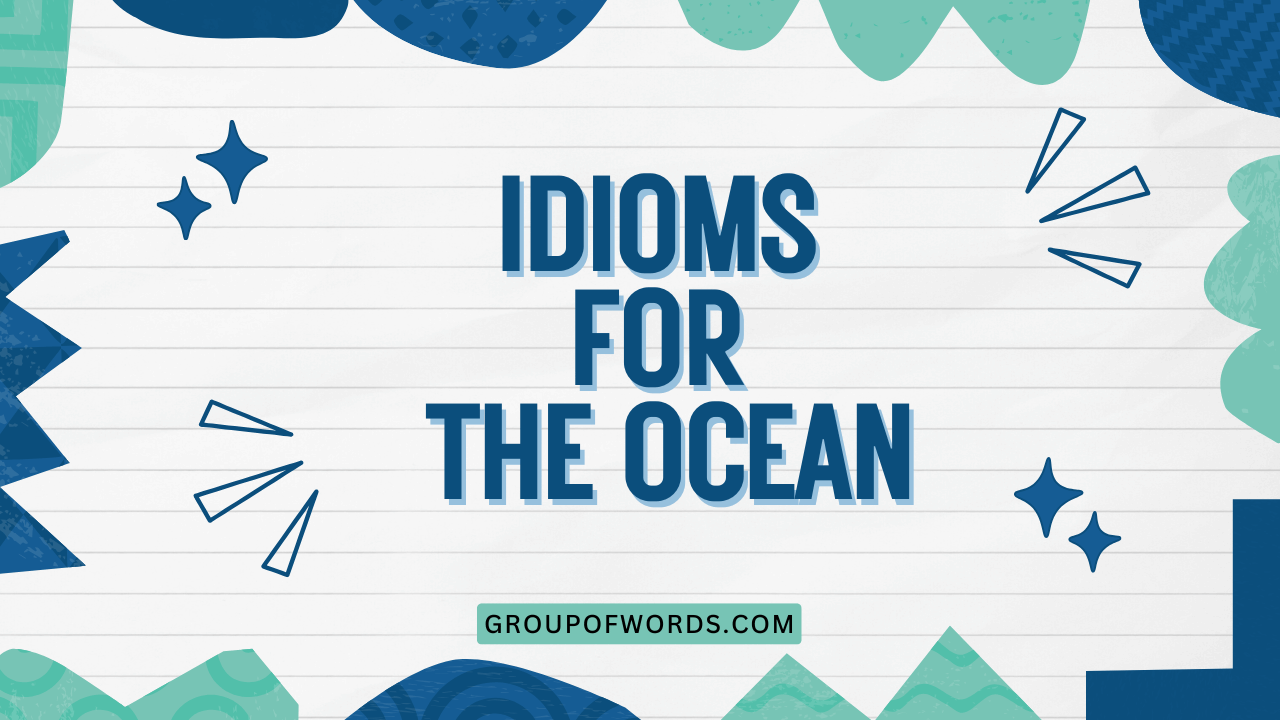Navigating the Sea of Language: Mastering Ocean Idioms
Idioms are the vibrant colors of language, adding depth and nuance to our communication. When these idioms draw inspiration from the ocean, they evoke powerful imagery, reflecting the vastness, unpredictability, and profound beauty of the sea.
Understanding and using these idioms effectively enhances your English fluency and allows you to express yourself with greater creativity and impact. This article will guide you through the fascinating world of ocean-related idioms, providing definitions, examples, and practical exercises to help you master their usage.
Whether you’re an English language learner or a native speaker looking to enrich your vocabulary, this comprehensive guide will equip you with the knowledge and skills to navigate the sea of language with confidence.
This article is designed for English language learners of all levels, from beginner to advanced, as well as native speakers who want to expand their idiomatic knowledge. By the end of this guide, you will be able to recognize, understand, and appropriately use a wide range of ocean-related idioms in your everyday conversations and writing.
Table of Contents
- Definition of Ocean Idioms
- Structural Breakdown of Ocean Idioms
- Types and Categories of Ocean Idioms
- Examples of Ocean Idioms
- Usage Rules for Ocean Idioms
- Common Mistakes with Ocean Idioms
- Practice Exercises
- Advanced Topics in Ocean Idioms
- Frequently Asked Questions
- Conclusion
Definition of Ocean Idioms
An idiom is a phrase or expression whose meaning cannot be understood from the literal meanings of its individual words. Instead, it carries a figurative meaning that is culturally specific.
Ocean idioms are a subset of these, drawing their imagery and symbolism from the sea, its creatures, and related concepts. These idioms often convey emotions, situations, or experiences in a vivid and memorable way.
Ocean idioms can be classified based on their function within a sentence. They often act as verbs, nouns, adjectives, or adverbs, contributing to the overall meaning and tone of the communication.
The context in which an idiom is used is crucial for understanding its intended message. For example, the idiom “in deep water” can refer to being in trouble, while “making waves” can mean causing a disturbance or creating a significant impact.
Understanding ocean idioms is essential for comprehending spoken and written English, particularly in informal contexts. They add color and expressiveness to language, allowing speakers and writers to convey complex ideas and emotions concisely.
Familiarity with these idioms also provides insights into the cultural values and perspectives associated with the ocean.
Structural Breakdown of Ocean Idioms
Ocean idioms, like all idioms, resist a straightforward structural analysis. Their meaning is not derived from the sum of their parts.
However, we can examine the common structural elements that contribute to their effectiveness:
- Metaphor: Many ocean idioms rely on metaphor, using a sea-related image to represent a different concept. For example, “adrift” metaphorically describes feeling lost or without direction.
- Simile: Some idioms employ simile, comparing a situation or feeling to something related to the ocean. For example, “like a fish out of water” compares feeling uncomfortable or out of place to the distress of a fish removed from its natural habitat.
- Personification: The ocean itself is often personified, with idioms attributing human characteristics to it. For instance, “the tide has turned” suggests that fortunes or circumstances have changed, as if the tide is a conscious agent.
- Hyperbole: Some idioms use exaggeration to emphasize a point. “An ocean of tears” exaggerates the amount of sadness or grief someone is experiencing.
The grammatical structure of an ocean idiom can vary. Some are simple phrases, while others are more complex clauses.
Regardless of their structure, the key is to recognize the idiom as a unit of meaning and understand its figurative sense.
Types and Categories of Ocean Idioms
Ocean idioms can be categorized based on their themes and the types of situations or feelings they describe. Here are some common categories:
- Difficulty and Challenges: These idioms describe situations that are difficult, problematic, or risky. Examples include “in deep water,” “rock the boat,” and “weather the storm.”
- Success and Progress: These idioms describe situations of success, ease, or smooth progress. Examples include “smooth sailing,” “plain sailing,” and “afloat.”
- Change and Uncertainty: These idioms describe situations that are changing, unpredictable, or uncertain. Examples include “go with the flow,” “the tide is turning,” and “all at sea.”
- Emotions and Feelings: These idioms describe various emotions and feelings, such as sadness, happiness, or confusion. Examples include “an ocean of tears,” “over the moon,” and “like a fish out of water.”
- Action and Impact: These idioms describe actions that have a significant impact or cause a disturbance. Examples include “make waves,” “sink or swim,” and “throw someone overboard.”
Understanding these categories can help you to better understand the meaning and usage of different ocean idioms.
Examples of Ocean Idioms
This section provides extensive examples of ocean idioms, organized by category, to illustrate their meaning and usage. Each table contains a variety of idioms with clear definitions and example sentences.
Troubled Waters
The following table contains idioms related to difficulty and challenges. These idioms describe situations that are problematic, risky, or fraught with danger.
| Idiom | Definition | Example Sentence |
|---|---|---|
| In deep water | In serious trouble or difficulty | The company is in deep water after the scandal. |
| Rock the boat | To cause a disturbance or upset the status quo | I don’t want to rock the boat by suggesting changes. |
| Weather the storm | To survive a difficult period | The company managed to weather the storm of the recession. |
| Sink or swim | To succeed or fail entirely on one’s own efforts | The new recruits were left to sink or swim. |
| Run aground | To encounter problems or difficulties that prevent progress | The negotiations ran aground due to disagreements over funding. |
| Adrift | Without direction or purpose; lost | After losing his job, he felt adrift in life. |
| All at sea | Confused or uncertain | I’m all at sea with these new regulations. |
| A sea of troubles | A great number of problems | He faced a sea of troubles after his business failed. |
| Between the devil and the deep blue sea | Faced with two equally unpleasant choices | He was between the devil and the deep blue sea, unable to decide which option was worse. |
| In the doldrums | In a state of inactivity or stagnation | The economy has been in the doldrums for months. |
| Lost at sea | Completely lost or confused | Without a map, we were completely lost at sea. |
| Close to the wind | Taking a risk | He was sailing close to the wind with his risky investment. |
| Against the tide | Going against the general opinion or trend | She was swimming against the tide when she argued for change. |
| A drop in the ocean | A very small amount compared to what is needed | The money we raised was just a drop in the ocean compared to the total cost. |
| High and dry | Left in a helpless situation; abandoned | When the company closed, many employees were left high and dry. |
| Overboard | Beyond reasonable limits; excessive | His reaction was a bit overboard, considering the minor issue. |
| Water under the bridge | Past events that are no longer important | That argument is water under the bridge now; let’s move on. |
| A slippery slope | A course of action that seems harmless but leads to negative consequences | Allowing him to stay out late is a slippery slope. |
| Trouble is brewing | Indicating that problems or difficulties are developing | I could sense that trouble was brewing when they started arguing. |
| Up the creek without a paddle | In a difficult situation without the means to get out of it | If we miss the last bus, we’ll be up the creek without a paddle. |
| In a tight spot | In a difficult or awkward situation | He was in a tight spot when he realized he’d forgotten his wallet. |
| On the rocks | Likely to fail or end | Their marriage is on the rocks after a series of arguments. |
| Sailing into uncharted waters | Entering a situation with unknown risks and challenges | Starting a new business is like sailing into uncharted waters. |
Smooth Sailing
The following table contains idioms related to success and progress. These idioms describe situations of ease, smooth progress, or favorable conditions.
| Idiom | Definition | Example Sentence |
|---|---|---|
| Smooth sailing | Easy and without problems | After the initial challenges, it was smooth sailing for the rest of the project. |
| Plain sailing | Easy and straightforward; similar to “smooth sailing” | Once we got the funding, it was plain sailing. |
| Afloat | Surviving financially or managing to continue operating | The company is struggling to stay afloat during the recession. |
| In the same boat | In the same difficult situation as others | We’re all in the same boat when it comes to economic uncertainty. |
| Any port in a storm | In a difficult situation, any solution is welcome, even if it’s not ideal | I didn’t like the job, but it was any port in a storm when I needed money. |
| Have a good voyage | To wish someone well on a journey or endeavor | “I’m starting a new business.” “Well, have a good voyage!” |
| To sail through something | To pass or succeed easily | She sailed through the exam with flying colors. |
| All hands on deck | Everyone is needed to help with a task | We need all hands on deck to meet this deadline. |
| Steady as she goes | Maintain current course and speed | “Steady as she goes,” the captain ordered as they approached the harbor. |
| Come in with the tide | To arrive at the right time or when things are favorable | Opportunities will come in with the tide, so be patient. |
| Take the helm | To take control or leadership | She decided to take the helm and lead the team to success. |
| Full steam ahead | To proceed with maximum effort and speed | With the new funding, we’re going full steam ahead on the project. |
| Make headway | To make progress | We’re finally making headway on the negotiations. |
| In good shape | In good condition or well-prepared | The ship was in good shape for the long journey ahead. |
| A rising tide lifts all boats | When an economy is performing well, everyone benefits | The new policies are designed so that a rising tide lifts all boats. |
| Anchor | Someone or something that provides stability and security | Her family was her anchor during the difficult times. |
| Set sail | To begin a journey or new venture | They are ready to set sail on their new business venture. |
| Clear skies | A situation free from problems or difficulties | After the storm, there were clear skies ahead for the company. |
| Riding the wave | To take advantage of a current trend or opportunity | The company is riding the wave of the new technology. |
| Find your sea legs | To become accustomed to a new situation or environment | It took him a while to find his sea legs in the new job. |
| Keep your head above water | To manage to survive or cope with a difficult situation | He was just trying to keep his head above water during the financial crisis. |
| On board | In agreement or part of a team | Everyone is on board with the new plan. |
| Shipshape | In good order; well-organized | The office was kept shipshape and clean. |
The Deep End
The following table contains idioms related to diving into something, either literally or figuratively. While not all are strictly ‘ocean’ idioms, they relate to water bodies and are commonly used.
| Idiom | Definition | Example Sentence |
|---|---|---|
| Take the plunge | To commit to something risky or important | They decided to take the plunge and start their own business. |
| Jump in at the deep end | To start something difficult without preparation | He jumped in at the deep end by taking on the most challenging project. |
| Dive right in | To start something enthusiastically and without hesitation | She dove right in to the new assignment. |
| Get your feet wet | To begin to experience something new | Interning is a great way to get your feet wet in the industry. |
| Go overboard | To do something excessively | He went overboard with the decorations for the party. |
| Swim against the current | To go against popular opinion or established norms | It’s hard to swim against the current in this conservative town. |
| Test the waters | To try something out before committing | Let’s test the waters before launching the new product. |
| Turn the tide | To reverse a trend or situation | A new strategy helped to turn the tide of the failing company. |
| Make a splash | To gain attention or make an impact | The new movie is expected to make a splash at the box office. |
| Keep afloat | To maintain a business or organization at a satisfactory level | The small business struggled to keep afloat during the recession. |
| Throw someone in the deep end | To give someone a difficult task without preparation | The new employee was thrown in the deep end and expected to perform. |
| Come hell or high water | No matter what difficulties may occur | Come hell or high water, I will finish this project. |
Other Common Ocean Idioms
Here’s a table with a broader range of ocean idioms, demonstrating their diverse meanings and applications.
| Idiom | Definition | Example Sentence |
|---|---|---|
| Make waves | To cause a disturbance or create a significant impact | The new policy is expected to make waves in the industry. |
| Throw someone overboard | To abandon or betray someone | The company threw him overboard after the scandal. |
| A sea change | A major transformation or shift | The internet has brought about a sea change in communication. |
| Go with the flow | To adapt to circumstances and not resist change | It’s best to just go with the flow when traveling in a foreign country. |
| The tide is turning | Circumstances are changing in one’s favor | The tide is turning for the struggling company. |
| Like a fish out of water | Feeling uncomfortable or out of place | He felt like a fish out of water at the formal event. |
| An ocean of tears | A great amount of sadness or grief | There were an ocean of tears at the funeral. |
| Over the moon | Extremely happy | She was over the moon when she got the job offer. |
| Plain sailing | Easy and straightforward | Once we got the funding, it was plain sailing. |
| Dead in the water | Failed or no longer effective | The project is dead in the water due to lack of funding. |
| Riding high | Experiencing great success or good fortune | The team is riding high after their championship win. |
| Close to shore | Near to completion or success | We are close to shore with this project, just a few tasks left. |
| Keep something at bay | To prevent something from approaching or affecting you | He worked hard to keep his creditors at bay. |
| Between Scylla and Charybdis | Between two dangers, where avoiding one means facing the other | The company was between Scylla and Charybdis, facing two equally bad options. |
| Full of hot air | Talking a lot without saying anything substantial | He’s full of hot air and never delivers on his promises. |
| Make land | To arrive at a destination or goal | After a long journey, they were glad to make land. |
| Run a tight ship | To manage something efficiently and strictly | The manager runs a tight ship in the office. |
| Seas the day | A play on “seize the day,” encouraging one to make the most of the present | Let’s seas the day and try something new! |
| Take to something like a duck to water | To be naturally good at something | She took to playing the piano like a duck to water. |
| That ship has sailed | That opportunity has passed and cannot be recovered | We missed the deadline, so that ship has sailed. |
| Know the ropes | To be familiar with the details of a job or situation | Once you know the ropes, the job is easy. |
| Touch and go | Uncertain; with a risk of failure | The surgery was touch and go, but he pulled through. |
| Below the surface | Not immediately apparent; hidden | Below the surface, there were deeper issues in their relationship. |
Usage Rules for Ocean Idioms
Using ocean idioms correctly requires understanding their figurative meaning and applying them in appropriate contexts. Here are some key usage rules:
- Understand the figurative meaning: Always be aware of the idiomatic meaning, which is different from the literal meaning of the words.
- Consider the context: Use idioms that are appropriate for the situation and audience. Some idioms are more formal than others.
- Use correct grammar: While idioms are fixed expressions, they still need to fit grammatically into the sentence. For example, you might need to conjugate a verb within the idiom.
- Avoid overuse: While idioms can add color to your language, using too many can make your speech or writing sound unnatural.
- Be aware of cultural differences: Idioms can vary across cultures, so be mindful of your audience and avoid using idioms that might be confusing or offensive.
It’s also important to note that some idioms have variations. For example, “in deep water” can also be expressed as “in hot water,” although the latter is not specifically ocean-related.
Be aware of these variations and use them appropriately.
Common Mistakes with Ocean Idioms
Learners of English often make mistakes when using idioms. Here are some common errors and how to avoid them:
| Incorrect | Correct | Explanation |
|---|---|---|
| He is in a deep water. | He is in deep water. | The idiom “in deep water” does not require the article “a.” |
| She rocked the boat too much. | She rocked the boat too much. | This is grammatically correct, but it is better to consider the context of usage and whether the user has overused the idiom. |
| They are weathering the rain. | They are weathering the storm. | The idiom is “weather the storm,” not “weather the rain.” |
| I felt like a fish from water. | I felt like a fish out of water. | The correct preposition is “out of,” not “from.” |
| The tide is turning me. | The tide is turning. | The idiom “the tide is turning” is complete and doesn’t need an object. |
| He went over the ship. | He went overboard. | The correct idiom is “overboard,” meaning beyond reasonable limits. |
| We are all in the same boat. | We are all in the same boat. | This is grammatically correct, but it is better to consider the context of usage and whether the user has overused the idiom. |
| She made a sea change on the project. | She brought about a sea change in the project. | The idiom is “bring about a sea change”. |
By being aware of these common mistakes, you can improve your accuracy and confidence when using ocean idioms.
Practice Exercises
Test your understanding of ocean idioms with these practice exercises. Choose the correct idiom to complete each sentence.
Exercise 1: Fill in the Blanks
| Question | Answer |
|---|---|
| After losing his job, he felt completely __________. | adrift |
| The company is __________ after the scandal. | in deep water |
| I don’t want to __________ by suggesting changes. | rock the boat |
| The company managed to __________ of the recession. | weather the storm |
| The new recruits were left to __________. | sink or swim |
| The negotiations __________ due to disagreements over funding. | ran aground |
| I’m __________ with these new regulations. | all at sea |
| He faced __________ after his business failed. | a sea of troubles |
| He was __________ , unable to decide which option was worse. | between the devil and the deep blue sea |
| The economy has been __________ for months. | in the doldrums |
Exercise 2: Multiple Choice
| Question | Answer |
|---|---|
| Which idiom means “to succeed or fail entirely on one’s own efforts”? a) In deep water b) Rock the boat c) Sink or swim |
c) Sink or swim |
| Which idiom means “easy and without problems”? a) In deep water b) Smooth sailing c) Rock the boat |
b) Smooth sailing |
| Which idiom means “confused or uncertain”? a) All at sea b) Smooth sailing c) In deep water |
a) All at sea |
| Which idiom means “to cause a disturbance or upset the status quo”? a) Weather the storm b) Rock the boat c) Sink or swim |
b) Rock the boat |
| Which idiom means “to survive a difficult period”? a) Weather the storm b) Rock the boat c) Sink or swim |
a) Weather the storm |
| Which idiom means “In a state of inactivity or stagnation”? a) In the doldrums b) sink or swim c) All at sea |
a) In the doldrums |
| Which idiom means “past events that are no longer important”? a) Trouble brewing b) adrit c) water under the bridge |
c) water under the bridge |
| Which idiom means “Without direction or purpose; lost”? a) Trouble brewing b) adrift c) water under the bridge |
b) adrift |
| Which idiom means “Indicating that problems or difficulties are developing”? a) Trouble brewing b) adrift c) water under the bridge |
a) Trouble brewing |
| Which idiom means “Likely to fail or end”? a) Trouble brewing b) on the rocks c) water under the bridge |
b) on the rocks |
Exercise 3: Sentence Completion
| Question | Answer |
|---|---|
| Starting a new business is like __________. | sailing into uncharted waters |
| After the initial challenges, it was __________ for the rest of the project. | smooth sailing |
| He felt __________ at the formal event. | like a fish out of water |
| We need __________ to meet this deadline. | all hands on deck |
| The new movie is expected to __________ at the box office. | make a splash |
| Let’s __________ and try something new! | seas the day |
| The company is __________ during the recession. | struggling to stay afloat |
| Opportunities will __________, so be patient. | come in with the tide |
| He will __________, no matter what difficulties may occur. | come hell or high water |
| The manager __________ in the office. | runs a tight ship |
Advanced Topics in Ocean Idioms
For advanced learners, exploring the etymology and historical context of ocean idioms can provide a deeper understanding of their meaning and usage. Many ocean idioms have their roots in maritime history, reflecting the importance of seafaring in English culture.
Additionally, analyzing the use of ocean idioms in literature and film can reveal how these expressions contribute to character development, plot, and theme. Consider how authors and filmmakers use idioms to create vivid imagery and convey complex emotions.
Finally, exploring the cross-cultural variations of ocean idioms can highlight the ways in which different cultures perceive and interact with the sea. Some idioms may have direct equivalents in other languages, while others may be unique to English.
Understanding these differences can promote cross-cultural communication and understanding.
Frequently Asked Questions
- What is the difference between an idiom and a metaphor?
An idiom is a fixed expression whose meaning is different from the literal meaning of its individual words. A metaphor is a figure of speech that compares two unlike things, suggesting a similarity between them. While some idioms may contain metaphors, not all metaphors are idioms. Idioms are culturally specific and have a conventional meaning, while metaphors are more flexible and open to interpretation.
- How can I improve my understanding of idioms?
The best way to improve your understanding of idioms is to read and listen to English as much as possible. Pay attention to how native speakers use idioms in context. You can also use idiom dictionaries and online resources to learn new idioms and their meanings. Practice using idioms in your own speech and writing to reinforce your understanding.
- Are there any idioms that should be avoided?
Some idioms may be considered offensive or inappropriate in certain contexts. It’s important to be aware of the potential impact of your language and avoid using idioms that could be hurtful or discriminatory. If you’re unsure about the appropriateness of an idiom, it’s best to err on the side of caution and choose a different expression.
- How do I know when to use an idiom?
Use idioms when they fit naturally into the context and enhance your communication. Avoid forcing idioms into your speech or writing, as this can sound unnatural. Consider your audience and the formality of the situation. Idioms are generally more appropriate in informal settings.
- Can idioms be translated literally?
No, idioms cannot be translated literally. The meaning of an idiom is figurative and cannot be understood from the meanings of its individual words. Translating an idiom literally will likely result in a nonsensical or incorrect message. Instead, you should find an equivalent idiom in the target language or express the same idea using different words.
- Why are idioms so difficult to learn?
Idioms are difficult to learn because their meaning is not transparent. You cannot understand the meaning of an idiom simply by knowing the meanings of its individual words. Additionally, idioms are often culturally specific, so their meaning may not be obvious to someone from a different cultural background. Learning idioms requires memorization and exposure to the language in context.
- Are there regional variations in idioms?
Yes, there are regional variations in idioms. Some idioms may be more common in certain regions or countries than others. Additionally, the meaning of an idiom may vary slightly depending on the region. It’s important to be aware of these regional variations and use idioms that are appropriate for your audience.
- Is it okay to mix idioms?
Mixing idioms (combining parts of different idioms) is generally not a good idea, as it can create confusion and sound awkward. For example, saying “We’ll burn that bridge when we get to it” (mixing “cross that bridge when we get to it” and “burn bridges”) doesn’t make sense. It’s best to use idioms correctly and avoid mixing them.
Conclusion
Mastering ocean idioms is a valuable step towards enhancing your English fluency and cultural understanding. By understanding the definitions, structural elements, and usage rules of these expressions,
you can add depth and color to your communication.
Whether you’re navigating challenging situations (“in deep water”) or enjoying smooth progress (“smooth sailing”), these idioms provide a rich and evocative way to express yourself. Continue to explore and practice using ocean idioms to enrich your vocabulary and connect with the sea of language.






